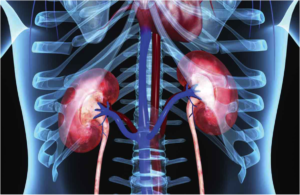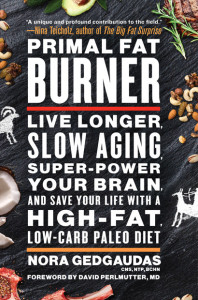
I periodically get asked about concerns regarding the growing rates of kidney disease and concerns about kidney health in general in relation to a diet based in animal source foods. The worry is that consuming animal protein might somehow put a strain on kidneys and even lead to kidney damage over time.
Here are the facts:
In the United States, approximately one in three adults aged 65 years and older currently has chronic kidney disease. Certain mainstream sources are determined to find every which way to blame and further vilify animal source foods in this equation (and innumerable others), while extolling the supposed virtues of a plant-based diet. This is a pervasive misinformation trend, and one that I take on in my newest book, Primal Fat Burner.
For starters, I don’t see the rise in kidney disease as necessarily being unrelated to the rise in metabolic syndrome. Metabolic syndrome is the result of insulin resistance (which, in turn, is overwhelmingly the result of excess carbohydrate consumption—not fat or protein consumption). As my friend, Ron Rosedale, MD has aptly pointed out (and I’m paraphrasing somewhat), the development of obesity, in some respects, is technically the price your body pays to try and keep you from becoming diabetic. Excess sugars continually get stored through the efforts of insulin in your fat cells until the day your fat cells are no longer able to respond to insulin and there’s no place else for the sugar to go. Among the tissues unfortunate enough to lack the capacity for insulin resistance include your nerve cells and brain tissue, which may become chronically bombarded with excess tissue-damaging insulin and glucose and undergo degenerative changes. Nerve cells are readily damaged by glycation and through this process eventually develop neuropathy. Brain cells similarly are extremely vulnerable here and deteriorate, rapidly glycate and oxidize, creating cognitive and memory problems in setting the stage for dementias, including Alzheimer’s disease. The arterial endothelium gets increasingly damaged and scarred by the effects of insulin and the oxidation of glucose. Surges of insulin and leptin stimulate sympathetic nervous system activity, causing the body to rapidly lose magnesium and the vessels to constrict, raising blood pressure and impairing cerebral and other vascular circulation. Vulnerable constricted blood vessels, clogged with glycated and oxidized plaques, and especially smaller vessels that supply the eyes and kidneys begin to become compromised, impairing blood supplies there. Although this gets directly associated with diabetes, it is a process that is quite literally happening to everyone over time. It is simply a matter of how quickly this occurs in anyone based in large measure on how a person is choosing to eat.
Although there is certainly evidence that a high-protein diet can be harmful to someone with pre-existing kidney damage/kidney disease (and low protein diets are routinely prescribed to those with renal pathology), those having normal, healthy kidney function have literally nothing to fear from quality animal-source proteins (i.e., meat, fish, eggs). There is literally no evidence to support any claim of dietary protein’s harm to healthy renal tissue or function. There is evidence to support dietary protein’s safety, however. In one study where healthy subjects between the ages of 30 and 80 eating 100 g or more protein a day were compared with long-term vegetarians eating 30 g or less of protein per day researchers concluded that both groups had similar kidney function.[1] In another group looking at the impact of high protein consumption on bodybuilders and strength athletes consuming high levels– up to 2.8 g/kilogram of protein daily (which amounts to 210 g of protein for a roughly 75 kg individual) led to measurements of kidney function that fell within totally normal ranges.[2] And finally, a peer-reviewed article published in the journal, Nutrition & Metabolism in 2005, titled “Dietary protein intake and renal function” concluded that “While protein restriction may be appropriate for treatment of existing kidney disease, we find no significant evidence for a detrimental effect of high protein intakes on kidney function in healthy persons after centuries of a high-protein Western diet.”[3] The problem isn’t actually protein, per se, but inflammatory glycated (i.e., sugar-coated) protein—which is able to camouflage, damage and slip past normal renal protein filtering mechanisms and appear in the urine as measurable proteinurea. In other words, the main problem at its core is excess blood sugar and resulting uncontrolled glycation.
Now all this said, I want to point out that the dietary approach that I advocate for in all of my books actually calls for strict protein moderation. Not because of any concerns about kidney damage, but for much better reasons that involve improved longevity effects (a result of curbing a metabolic pathway associated with protein sensing that can lead to unnecessary cellular proliferation known as mTOR) and the minimization of unnecessary sugar production. Depending on who you are talking to, anywhere from 36% (Richard K. Bernstein, MD) to 58% (Hans Krebs) of the protein consumed in excess of what is needed to meet the repair and regeneration needs of the body may be ultimately be converted to glucose and used the same way.
It has been suggested by some that vegetarianism/veganism is somehow superior in its effects upon renal health. As a pertinent aside, we as humans are primarily designed with a hydrochloric acid-based digestive system to obtain our complete source protein from animal source foods. Natural herbivores are designed to get their nutrients from the bacterial fermentation of plant fiber (something we humans are ill-equipped to do). It’s interesting to point out that no less than 70% of the actual calories a cow obtains from its exclusively plant-based diet actually come from saturated fat (a short-chained fatty acid known as butyric acid) and NOT carbohydrates—derived from the bacterial fermentation of all that fiber. Even the animals designed to eat carbohydrate-based diets aren’t relying on carbohydrates as their primary source of fuel! We, on the other hand are designed to get our fats— including the ones that were actually used in the construction of our uniquely sophisticated brains— directly from animals that have synthesized them for us. But all large mammals are actually designed to run on fat as a primary source of fuel—even herbivores. We humans are literally the best designed of all animals to do so and have brains uniquely capable of running almost exclusively on ketones as a super fuel full-time. Relying on glucose as a primary (as opposed to auxiliary) source of fuel is a modern-day phenomenon for us humans and one to which we are ill adapted, and for many, this has led to a chronic state of metabolic enslavement.
But even though there is evidence for high levels of persistent carnivory among our evolutionary antecedents up to two-million years ago[4] (and zero evidence in the stable isotopic data to suggest that we ever relied on plant foods as a meaningful source of calories or protein, much less as a primary source of nourishment), and our physiological makeup is demonstrably best designed to make use of animal source foods, that doesn’t mean that more protein is necessarily better. Relative to our best longevity considerations, it’s important that we meet, but not exceed those requirements. Kidney health really isn’t a part of this concern, however.
My work is focused on the idea of consuming a diet most in alignment with our evolutionary and genetic heritage and then tweaking those principles by taking the research of human longevity into consideration. It stands to reason that anything that improves longevity is also serving to minimize disease. This means minimizing our need for insulin and moderating our intake of protein. The result amounts to a more optimized diet that is low in utilizable carbohydrate (i.e., low sugar/starch), moderate in protein (no more than 0.8 g/kg of estimated ideal body weight for average adults) and higher/sufficient in its intake of dietary fat from a variety of fully pastured animal sources and some plant sources (such as olive oil, avocado oil, macadamia nut oil and coconut oil). Overall, fat calories actually dominate here, even as fibrous vegetables and greens may visually dominate the plate. Yes–fibrous vegetables and greens low in sugar and starch are also included here and encouraged in a wide variety and preparation methods, as tolerated. Although we still have no scientifically established dietary requirement for them (and some persons cannot tolerate them at all due to things like SIBO/small intestinal bacterial overgrowth) they still have a particularly valuable role to play in modern times with respect to containing certain beneficial phytonutrients, antioxidants, detoxification effects and as helpful fodder for our embattled internal wildlife (i.e., microbiome). This ultimately amounts to a higher fat (in caloric energy terms) and low carb, ketogenic dietary approach with an uncompromising focus on food quality in alignment with our evolutionary and genetic heritage. I have more recently decided to simplify this unique distinction I have established in my work by coining the term, “Primalgenic®”.
I make the exhaustive case in my most recent book, Primal Fat Burner, for this being the most natural and optimizing metabolic state of humankind.
The basis of our unique human cognition relies upon two (20- and 22-carbons long) fatty acids in particular: arachidonic acid and docosahenaenoic acid (DHA)… both of which are exclusively found within the human diet in animal source foods. And by the way, if DHA is not in your diet, then it is not in your brain, either. In my books I additionally highlight the research showing that a fat-based ketogenic approach can improve cerebral circulation by 39% in normal humans. Also, a fat-based ketogenic approach has also been shown to even improve heart efficiency up to 28%. Astonishing. The list of long term benefits associated with this way of eating is beyond extensive, in fact. And it is illogical to suggest that significant improvements in the heart and brain might also somehow result in damage to other organs and tissues. In fact, the “Primalgenic®” dietary approach I recommend is right in alignment with studies showing dramatic benefit in those suffering renal disease!
When it comes to kidney disease, dietary protein is NOT the foundational issue. In part, excess carbohydrate consumption and glycation IS. High fructose foods are particularly implicated here, since fructose is no less than 10 times more glycating in the body than glucose. The number one condition associated with the need for renal dialysis is diabetes, by the way. In at least one study conducted at Mount Sinai school of medicine, a low carbohydrate and high-fat ketogenic diet was shown to literally reverse kidney failure in persons with diabetes.[5] In an article discussing these findings in NewsWise, Dr Charles Mobbs, PhD, Professsor of Neuroscience and Geriatrics and Palliative Care Medicine at Mount Sinai School of Medicine was quoted as saying, “Our study is the first to show that a dietary intervention alone is enough to reverse this serious complication of diabetes.”[6]
But if not animal source foods, to what else can we attribute to the burgeoning levels of kidney disease/dysfunction (affecting many more millions of Americans than those currently diagnosed)?
Take your pick:
- Up to 15% of people on dialysis are receiving treatment as a result of the damage that NSAIDS (aspirin or Tylenol) did to their kidneys. One study in the Journal of the American Geriatrics Society in May 1999 stated that “Blood tests of elderly patients taking regular doses of nonsteroidal anti-inflammatory drugs (NSAIDs) showed higher levels of laboratory values that indicate kidney dysfunction than those not taking the drugs. NSAIDs are commonly prescribed to older adults to control pain and inflammation. While frequent use of NSAIDs can affect kidney function in patients of all ages, it may be particularly damaging in older adults due to declining renal function that accompanies age.”[7] In an article in the New York Times in January 2002, a clinical professor of urology at the University of Chicago was quoted as saying “Decreased kidney function is a known side effect with almost every anti-inflammatory drug you can think of.”[8]
- Statin use has also been linked with kidney disease/kidney failure.[9] [10]
- Mercury exposure/toxicity (an increasing problem[11]) is a known vector for renal damage.[12] Mercury is ranked third by the US Government Agency for Toxic Substances and Disease Registry of the most toxic elements or substances on the planet to arsenic and lead that continues to be dumped into our waterways and soil, spilled into our atmosphere, and consumed in our food and water.[13] [14] Mercury can cause kidney damage and evidence suggests a linkage between mercury exposure and acute tubular necrosis, glomerulonephritis, chronic renal disease, renal cancer and nephrotic syndrome.[15] [16] [17] [18]
- Vitamin D deficiency may also be an independent risk factor for renal failure.[19]
- Gluten immune reactivity has also been linked with renal complications, and a gluten-free diet has even demonstrated efficacy in “completely reversing” proteinuria in renal patients.[20] Furthermore, the same immune mediator that causes gluten intolerance may also be responsible for ‘immunoglobulin-A nephropathy’, an autoimmune disorder that affects your kidneys (an antibody called immunoglobulin A, or IgA, builds up in your kidneys, preventing them from filtering waste products, electrolytes and water from your blood).[21]
- Glyphosate residues in food/water: This may be one of the biggest culprits. The world’s most heavily used herbicide, Roundup (glyphosate) was implicated in the study published in the International Journal of Environmental Research and Public Health in 2014 titled “Glyphosate, Hard Water and Nephrotoxic Metals: Are They the Culprits Behind the Epidemic of Chronic Kidney Disease of Unknown Etiology in Sri Lanka?”. Researchers were studying the epidemic levels of kidney disease present in farmers in Sri Lanka that appeared to be the result of toxic nephropathy. The researchers in this article stated in their conclusions that “…it [glyphosate] seems to have acquired the ability to destroy the renal tissues of thousands of farmers when it forms complexes with a localized geo-environmental factor (hardness) and nephrotic metals.”[22]
- Chronic dehydration: 60 to 70% all acute renal failure cases are the result of not enough blood flow being able to reach the kidneys. The occlusion of small blood vessels in diabetic conditions is a major vector for this, certainly, but it’s also important to acknowledge the role that hydration plays in supporting and maintaining blood volume renal health and helping to minimize the risk of kidney stones. Also, according to researchers in a 2015 study concerning the relationship between hydration and chronic kidney disease, there is also a “recognition that mild dehydration maybe a risk factor in progression of all types of CKD [Chronic Kidney Disease].” And, “…there is some evidence that increasing hydration, particularly with water, may actually prevent CKD.[23] Given the prevalence an popularity of diuretic beverages that include all manner of coffee drinks, energy beverages, caffeinated teas, sports drinks, juices and sodas, this too likely isn’t helping.
Add all this to our crappy Western diet— which, by the way has not increased its protein consumption in any significant way since 1965[24]—and I don’t know why anyone would be surprised that kidney disease— along with just about every other kind of disease under the sun— is on the rise. According to The Lancet, “Over 95% of the world’s population has health problems, with over a third having more than five ailments.” [25] Frankly, kidney disease is only but one of nearly countless growing health concerns we could all be wringing our hands over.
So why do carbohydrate-based recommendations persist as government health policy in the face of all the available evidence? Apart from reasons offered by famed cardiologist (and co-director of the Framingham Heart Study), George V. Mann, ScD, M.D in his candid disdain for the bogus Diet Heart Hypothesis that he referred to as “pride, profit and prejudice”, I can think of no multinational corporate interest (in unprecedented control of news and media sources) that would not be fully invested in every man, woman and child consuming a diet based on carbohydrate-rich foods. –They are cheap and easy to produce, massively profitable (no way one can make a 5000% profit on a grass-fed steak like you can with a box of cereal) and they keep persons eating this way perpetually hungry.
Nice for Monsanto and Nabisco.
The profiteers from this form of metabolic enslavement extend from those controlling Big Agribusiness, the Food Industry, the Bio-Tech Industry, Chemical Industries, and Big Pharma. Oh– and did I mention that the number one customer for Big Oil is Big Agribusiness? It pays to follow the money. And it pays to question the motives behind just about every news/government health agency headline.
By the available evidence, our ancestors have been operating in a primarily hunting economy, eating a diet extremely high in animal source foods for more than two- million years. Our kidneys (along with our hearts and our brains) have been evolving right with us all this time, and only in recent times seem to be showing widespread evidence of pathology and impairment.
The problem is not, and never was, animal source foods.
~ Nora Gedgaudas, CNS, NTP, BCHN
Check out my Primal Restoration® Certification Program
REFERENCES:
[1] Blum M, et al. Protein Intake and Kidney Function in Humans: Its Effect on Normal Aging. Archives of Internal Medicine, 1989; 149 (1): 211-212.
[2] Poortmans JR, Dellalieux O. Do regular high protein diets have potential health risks on kidney function in athletes? International Journal of Sports Nutrition and Exercise Metabolism, Mar. 2000; 10 (1): 28-38.
[3] Martin WF, Armstrong LE and Rodriguez NR. “Dietary protein intake and renal function.” Nutrition & Metabolism 2005, 2:25 doi:10.1186/1743-7075-2-25.
[4] Ferraro JV, Plummer TW, Pobiner BL, et al. “Earliest Archaeological Evidence of Persistent Human Carnovory.” PLoS One. 2013; 8(4): e62174.
[5] Poplawski MM, Mastaitis JW, Isoda F, Grosjean F, Zheng F, Mobbs CV (2011) “Reversal of Diabetic Nephropathy by a Ketogenic Diet.” PLoS ONE 6(4): e18604. https://doi.org/10.1371/journal.pone.0018604
[6] http://www.newswise.com/articles/low-carbohydrate-diet-may-reverse-kidney-failure-in-people-with-diabetes
[7] Journal of the American Geriatrics Society. May, 1999;47:507-511
[8] http://www.nytimes.com/2002/01/29/sports/pro-basketball-health-risk-stems-players-use-of-painkillers.html
[9] “AstraZeneca’s Crestor May Harm Kidneys”, Yahoo! News – Friday, October 29, 2004
[10] https://www.drugwatch.com/crestor/side-effects/
[11] https://en.wikipedia.org/wiki/Minamata_Convention_on_Mercury
[12] Rice KM, Walker Jr EM, Wu M, et al. “Environmental Mercury and Its Toxic Effects.” J Prev Med Public Health. 2014 Mar; 47(2): 74–83.
[13] Clifton JC., 2nd Mercury exposure and public health. Pediatr Clin North Am. 2007;54(2):237–269.
[14] US Department of Health and Human Services, Public Health Service. Toxicological profile for mercury. Atlanta: US Department of Health and Human Services; 1999. pp. 1–600.
[15] Tchounwou PB, Ayensu WK, Ninashvili N, Sutton D. Environmental exposure to mercury and its toxicopathologic implications for public health. Environ Toxicol. 2003;18(3):149–175.
[16] Li SJ, Zhang SH, Chen HP, Zeng CH, Zheng CX, Li LS, et al. Mercury-induced membranous nephropathy: clinical and pathological features. Clin J Am Soc Nephrol. 2010;5(3):439–444.
[17] Park JD, Zheng W. Human exposure and health effects of inorganic and elemental mercury. J Prev Med Public Health. 2012;45(6):344–352.
[18] Oliveira DB, Foster G, Savill J, Syme PD, Taylor A. Membranous nephropathy caused by mercury-containing skin lightening cream. Postgrad Med J. 1987;63(738):303–304.
[19] Melted ML, Astor B, Michos ED, et al. “25-hydroxyvitamin D levels, race, and the progression of kidney disease.” J Am Soc Nephrol. 2009 Dec;20(12):2631-9
[20] Jhaveri KD, D’Agati VD, Pursell R, Serur D. “Coeliac sprue-associated membranoproliferative glomerulonephritis (MPGN).” Nephrol Dial Transplant. 2009 Nov;24(11):3545-8
[21] Ludvigsson JF, Montgomery SM, Olén O, et al. “Coeliac disease and risk of renal disease—a general population cohort study.” Nephrology Dialysis Transplantation 2006 21(7):1809-1815
[22] Jayasumana C, Gunatilake S, Senanayake P. “Glyphosate, Hard Water and Nephrotoxic Metals: Are They the Culprits Behind the Epidemic of Chronic Kidney Disease of Unknown Etiology in Sri Lanka?” Int J Environ Res Public Health. 2014 ;11(2):2125-47. Epub 2014 Feb 20.
[23] Roncal-Jimanez C, Lanaspa MA, Jensen T, et al. “Mechanisms by Which Dehydration May Lead to Chronic Kidney Disease.” Ann Nutr Metab. 2015;66 Suppl 3:10-3. doi: 10.1159/000381239.
[24] Cohen E, Cragg M, deForsenka J, et al. “Statistical review of US macronutrient consumption data, 1965–2011: Americans have been following dietary guidelines, coincident with the rise in obesity.” Nutrition. May 2015. Volume 31, Issue 5, Pages 727–732. DOI: http://dx.doi.org/10.1016/j.nut.2015.02.007
[25] Global Burden of Disease Study 2013 Collaborators. “Global, regional, and national incidence, prevalence, and years lived with disability for 301 acute and chronic diseases and injuries in 188 countries, 1990–2013: a systematic analysis for the Global Burden of Disease Study 2013.” The Lancet, 2015 DOI: 10.1016/S0140-6736(15)60692-4



As always, a great article Nora. We truly appreciate you and your work…. much love!